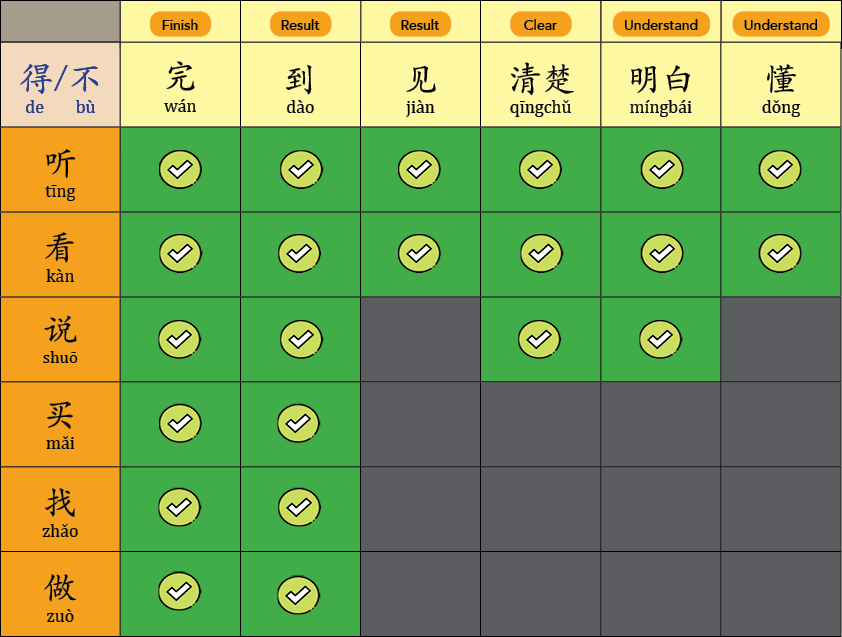Expressing the Results of Actions With Verb 得/不 Complement
Expressing the Results of Actions
Verb + 得 +
Complement
(Complement of Result)
a result can be obtained or a goal be reached
Verb + 不+ Complement
a result can't be obtained or a goal not to be reached
A lot of Chinese learners know how to say "I can't understand." 我听不明白. But do you know how this sentence is constructed? Today we'll learn about complements of possibility introduced by "verb + 不+complement” and its affirmative form “verb+得+complement”
Verb: 找,看,听,买,说,做
Complement:到,完,见,清楚,明白,懂
我听不懂 the action is 听,the goal of listening is to understand it. If the result is you can't understand it. You say “我听不懂” I listened but I can't understand what I’ve heard.
我听得懂 If the result is you can understand it, you can say "我听得懂”. I listened and I understood what I’ve heard.
Zhèlǐ tài hēile, nǐ zài nǎlǐ? Wǒ kàn bù jiàn.
这里太黑了,你在哪里?我看不见。
It's too dark here. Where are you? I look but I can't see you.
Nǐ kàn dé dào nàgè rén ma? Wǒ kàn dé dào.
你看得到那个人吗?我看得到。
Can you see that man? I can see him.
Zì tài xiǎole, wǒ kàn bù qīngchǔ.
字太小了,我看不清楚。
The character is too small. I look but I can't see it clearly.
Zhè jù huà shì shénme yìsi? Wǒ kàn bù míngbái.
这句话是什么意思?我看不明白。
What's the meaning of this sentence? I read but I don't understand.
Evan lǎoshī shuō zhōngwén shuō dé hěn qīngchǔ, xuéshēngmen dōu néng tīng dé dǒng.
Evan老师说中文说得很清楚,学生们都能听得懂。
Mr. Evan speaks Chinese very clearly and the students can understand when they listen.
Tā shìgè chīhuò, zǒng shì zhǎo dé dào yīxiē hěn hào chī de fàndiàn.
她是个吃货,总是找得到一些很好吃的饭店。
She is a foodie and can always find some very good restaurants.
Māmā shuō wǒ zuòyè zuò bù wán jiù bùnéng chūqù wán.
妈妈说我作业做不完就不能出去玩。
Mom said that if I can not finish doing my homework, then I can't go out to play.
Here is a chart of complement of result.
If you are confused about different complement, there is an article for you.
Verb 得de Complement
Verb 不bù Complement
Past Tense: verb complement 了le
Negative Past: 没有méiyǒu Verb Complement



